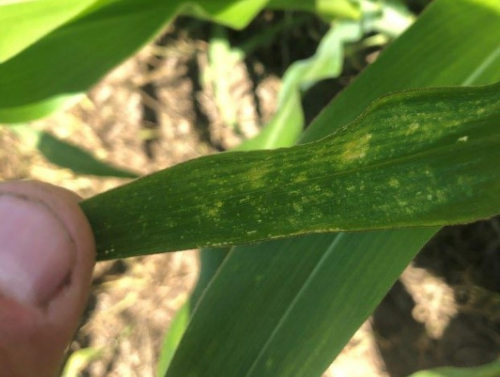By Nicole Santangelo and Charles White
Rapid corn growth syndrome leads to twisting of corn coming out of the whorl (Photo credit: Nicole Santangelo, Penn State)
Rapid Corn Growth Syndrome
Early season corn coming out of cooler spring into a warm summer can lead to temporary yellowing and wrinkled leaves as the corn grows faster than it can unroll. This may cause some twisting in the whorl, but in most cases the corn will resolve itself as crop progresses.
Potassium deficiency symptoms in corn (Photo credit: Charlie White, Penn State)
Potassium Deficiency
Corn fields low in potassium may suffer more during frost, disease, and drought. Potassium is vital to many plant functions especially related to plant defense and water regulation. Potassium deficiency exhibits at first as yellowing of the leaf tips on lower leaves as it is mobile in the crop. Yellowing will progress down the margins eventually turning brown and resulting in leaf “firing.” During drought, potassium uptake can be reduced as potassium moves to the plant roots through diffusion and water flow during water uptake by the plant. Therefore, even fields with adequate K can exhibit deficiency during prolonged dry weather. Sidewall compaction, which occurs when crops and planted into wet soil, can also reduce root growth and cause potassium deficiency early in the growing season, even when soil levels of potassium are optimal. For more information, read "
Pennsylvania Nutrient Management Program ".
Sulfur Deficiency
There are trends toward lower sulfur levels in Pennsylvania, which gives way to increased instance of sulfur deficiency. Sulfur deficiency presents as a pale green to yellow coloring of the leaves near the top of the corn plant. Since sulfur is not very mobile in the plant the newest growth will exhibit the most yellowing. Manure is an excellent source of sulfur as well as some fertilizers, such as ammonium sulfate and gypsum.
Read more on sulfur .
Nitrogen deficiency in young corn, Charlie White, Penn State
Nitrogen deficiency in mature corn, Charlie White, Penn State
Nitrogen Deficiency
Nitrogen, on the other hand is mobile in the corn plant and will take from the lower leaves to feed the growing leaves, therefore yellowing will occur on the lower leaves first. Young plants can show general deficiency, which exhibits as shorter plants with a paler green color. Corn that appears nitrogen deficient when it is young can be sidedressed at the V5 to V8 stage and recover fully without a yield drag. As the crop develops and becomes more severely deficient, the lower leaves will begin to yellow at the tip with the yellow area moving up the midrib in a V shape. Many farmers like to see their corn green all the way to the ground at physiological maturity, but this is actually an indication of over-fertilizing nitrogen. An optimally fertilized crop will have 3 to 4 leaves at the bottom of the plant turning pale by the end of the season. Read more on nitrogen management at "
Nitrogen Fertilization of Corn" .

Urea burn on top-dressed corn (Photo credit: Nicole Santangelo, Penn State)
Urea or UAN Burn
Urea spun on to a growing corn crop can fall in the whorl of the corn plant and burn a few leaves and similarly UAN solution dribbled on as a sidedress can spray some leaves This will cause temporary yellowing of typically just a few plants and a few upper leaves in a field. The damage may look concerning but does not typically lead to any yield loss.
ALS injury in corn, Photo: Penn State
Herbicide Damage
ALS herbicides may cause corn to exhibit symptoms including yellowing of young leaves, in the whorl or striping. Variable weather conditions may contribute to herbicide injury. Caution should be taken when spraying ALS herbicides late in the season as damage in the whorl may affect reproduction. Read more about herbicide damage, go to "
Corn and Soybean Herbicide Injury Symptoms Review" .
Further questions about yellowing in corn fields can be directed to your local county extension office and they would be happy to connect you with a Field and Forage Crop Extension Educator.
Source : psu.edu